|
|
 |
Internal Revenue Service Whistleblowers |
|
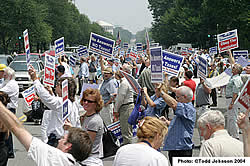
Photos: Todd Johnson 2004
http://www.givemeliberty.org
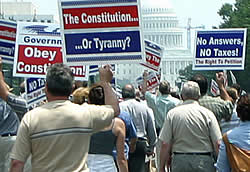
|
Because reading tax regulations is a function
of an IRS job, many IRS employees tend to know something the rest
of us don't. However, relatively few of them will tell you about
it. Brave are the ones who speak up to warn us.
Here's a big "Thanks!" for
the agents in government who actually follow the written law,
and obey the truth. When they blow the whistle on our government's
own fraud, they risk everything, and even give up some
things for the truth.
Below are just a few IRS whistleblowers. It is
unknown exactly how many government whistleblowers have come from
the IRS, because the first, and last, official IRS Historian,
Shelley Davis, told the US Senate "there were virtually
no records of IRS actions throughout the twentieth century in
any of the repositories"
So, the first whistleblower in our list is IRS
Historian Davis. Because, her experience shows that when a whistle
is blown at the IRS, an investigation of the whistleblower
soon begins.
Davis (and others) said this is "a common
tactic used against IRS employees who dare to speak up."
This tactic seems to demonstrate the existence of IRS abuse better
than anything else.
These IRS whistleblowers took a chance, and some
lost their jobs, to tell you something. It may be worth listening
to them. Most people do not have this kind of courage, and can
only keep very quiet. Some will even agree with tyrants rather
than warn others of dangers. Not only will most of us keep quiet,
but we'll even change the subject of thought in our own mind,
pretending nothing is wrong. What shame.
These former agents are still taking risks, because
no one leaves organized crime trouble-free.
|

Shelley Davis
Former IRS Official Historian.
In the 1990s she sacrificed her $69K job, and retirement, to blow
the whistle on illegal document destruction committed by the IRS.
Said she would do it again. |
Shelley L. Davis
Former IRS Official Historian, the first and the last official
historian.
"The records had been destroyed. Gone. Shredded. Tossed.
They no longer exist."
"No other agency of our government could get away with
this."
"Our fear of suffering a personal attack from the IRS
generally keeps most of us in check... This ensures that it can
never be held accountable for its actions. How can you prove any
wrongdoing when the evidence is already destroyed?"
-- Davis' prepared statement before the Senate Finance Committee,
Sept. 23, 1997. continued >>
|
|

Joseph Banister
CPA, Former IRS CID Special Agent
|
Joseph Banister
A former IRS Special Agent for Criminal Investigation Division,
and CPA, Banister comes from a law enforcement family. He has
two brothers working as policemen.
Banister sacrificed a big paycheck, and career
to tell you what the media won't tell you (US citizens are being
scammed).
"If you are a current or former IRS...
and you are ready to come out... send a letter to... Freedom Above
Fortune, PO Box 90239, San Jose, California, 95109-4239. I will
never reveal your name"
-- Joe Banister
Video:
Banister interview - with Alex Jones
Audio:
Former IRS agent Banister speaks, IRS "Walkaround"
Banister says he pays his taxes, but does not file a Form 1040
return. He "gave up" his career with the IRS (was told
to resign) in order to devote his life to stopping the IRS/government
income tax fraud.
As a IRS Special Agent, it was a part of Banisters job to read
the tax code and regulations. The result? He believes citizens
are not required to pay federal income taxes.
Banister's case went to court, where he was acquitted on charges
of conspiracy to defraud the United States [18USC371], and of
willfully aiding or assisting, procuring, counseling, or advising
the preparation of a return, which is fraudulent [26USC7206(2)].
"The IRS does not prevail against citizens because the
agency adheres to the rule of law... the IRS prevails against
citizens because the agency ignores the law, twists the meaning
of the law, and overwhelms the citizen with economic and legal
burdens" -- Joseph Banister
|
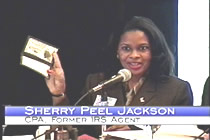
Sherry Peel Jackson
CPA, Former IRS Agent
"Do you understand that we are all slaves to this system?"
"Do you care? ... do your own research ...make a decision
to be an informed slave or get off the plantation! Don't buy any
[tax] research packages" -- Sherry Jackson's Blog
Jackson holds educational seminars around the country.
Audio:
Former
IRS agent Jackson speaks, Project Toto
|
Sherry Peel Jackson
CPA, Certified Fraud Examiner, Former Internal Revenue Service
Agent, 21 years exp.
Sherry Peel Jackson gets straight to the point. Not only is her
focus on this issue 20/20, but she says it best. She describes
America, the entire country, as a slave plantation.
"In my tenure as an IRS agent, I personally saw marriages
broken, families torn apart, homes confiscated and businesses
destroyed... without the proper authority."
"The Constitution of the United States of America has
been... ignored through allowing the privately owned Federal Reserve
to create paper currency and charge you 47 million dollars
in interest per hour"
"Let me tell you, that as a black woman I am keenly
aware... of slavery... do you understand that we are all slaves
to this system?" - Sherry Jackson more
>>
|
|
Photo: Todd Johnson 2004

"The IRS fears the public gaining a knowledge of how
their scam works."
John Turner
Former IRS Revenue Officer,
Tax Consultant
"The IRS knows the public is slowly realizing that
the tax system is a scam."
|
John Turner
Former IRS Revenue Officer (RO), Tax Consultant. Another IRS agent
who gave up a fat paycheck and a well benefitted government job
to tell us the laws and regulations are not being followed as
written, and it is the government that is the fraud.
"You do realize, don't you, that ...according
to the way Congress [and the IRS] would have you believe... ALL
of your income is subject to tax save what they let you keep by
their benevolence. They let us keep some of our income! This is
the mistaken notion that we Americans are operating upon!"
-- John Turner
Turner says he can prove there is no requirement to file income
tax returns. He worked for the IRS for 10 years from 1987-1997.
As a Revenue officer he used the power to levy and seize. He eventually
researched tax "protester" arguments, and discovered
the IRS is indeed misapplying the tax laws, then resigned from
the IRS.
Ex-IRS agent Turner also served in the United States Army and
held top secret clearances.
"There are many, many good people who have lost their
property and their freedoms... while attempting to force the government
to obey the tax laws as written."
"The solution requires the American people to demand
the needed change. ... Your help is needed to bring this to the
attention of people far and wide." more
>>
|

Clifton Beale
Former IRS Revenue Agent and IRS Appeals Officer, 18 years at
IRS.
Beale has a Master's Degree in Taxation and 28 years experience.
|
Clifton Beale
Former IRS Revenue Agent and IRS Appeals Officer, 28 years experience,
over 18 years at IRS.
Beale was an IRS agent (RO) from 1979 to 1987, and an IRS Appeals
Officer from 1987 to 1998. He is an author ('The Trust Bible',
and 'Feelings, The Second Book,' - the historical coverup by the
government since 1913) and has a Master's Degree in Taxation.
According to Former IRS Agent Joseph Banister "complying
with the United States Code has caused the IRS to take a disliking
to him..."
Beale was sued by the Department of Justice. He is no longer
allowed to prepare tax returns (he quit preparing returns before
the order) and must stop selling trusts and other "tax schemes."
|
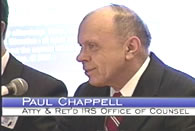
Paul Chappell
Former IRS Office of Counsel Attorney
A member of the bar of the State of Maryland since
1954.
"I do recall that the federal income
tax was promoted very heavily as not only a voluntary filing,
but a patriotic thing to do. I recall also how the Treasury
department engaged Walt Disney to prepare a series of cartoons
and things that were shown in the theaters. I do recall Donald
Duck running to the mail box with his 1040 in his hand."
-- Paul Chappell, Radio
Interview Feb. 23, 2008 on WTPRN.com
[Note: Income tax did not begin for most citizens
until the 1940's, when World War II was used as the reason to
"volunteer" your tax support. Much like today's "Support
our Troops" slogan, which is used to keep the war merchants
in operation.]
|
Paul Chappell
Former IRS Office of Counsel Attorney
An attorney for 50 years, Mr. Chappell's experience includes
17 years of government service, first as a clerk to a Tax Court
judge, and later working for the Office of Chief Counsel of Internal
Revenue.
Chappell's experience also includes covering the House Ways and
Means and Senate Finance Committee hearings in drafting 1954 Internal
Revenue Code.
He represented taxpayers before the Internal Revenue Service
and in the federal courts for approximately 30 years.
Mr. Chappell's concerns include: violations of IRS regulations
by the IRS; violations of statutory requirements by the
IRS; disregard of their own math and records system; manipulation
of data on the IRS master record system; ignoring statutory requirements
for making proper assessment of taxes; the ignoring of requirements
for collection matters such as the enforcement of IRS liens, levies
and property seizures; and also a great deal of concern about
the current trend toward abusive searches and seizures.
The story comes down from the top...
and it spreads around...
|
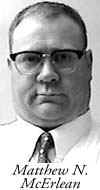
Matthew N. McErlean
Former IRS Senior Appraiser and Valuation Subject Matter Expert
McErlean's experience includes an MBA, MS, MAI,
CAE, and CPA.
McErlean refused a forced transfer, then the IRS
declared him AWOL and stopped his pay. Another American in the
IRS who risked it all to tell the truth.
McErlean begins his report to the Treasury Inspector
General by utilizing the parent class of the tax code, the Constitution.
|
Matthew N. McErlean
Former IRS Senior Appraiser and Valuation Subject Matter Expert,
MBA, MS, MAI, CAE, CPA.
In 1996, McErlean tried to help the IRS get more revenue by submitting
a memo suggesting the IRS adopt the Uniform Standards of Professional
Appraisal Practice. He said the IRS was losing billions by not
following uniform standards.
In 1999, McErlean made a report to the Treasury Inspector General
of Tax Administration, in which he said IRS managers were violating
the Constitution, and rights of American taxpayers.
"I have made consistent attempts... over the past three
years, urging IRS management to correct the situation. The only
visible result to date is that I have been the subject of adverse
and retaliatory personnel actions."
"Article 1 Section 8 of the United States Constitution
stipulates that while Congress has the power to lay taxes, '...all
duties, imposts, and excises shall be uniform
throughout the United States.' ... it is axiomatic that the underlying
methodology of laying taxes must be uniform... current appraisal
practices do not yield uniformity in assessing tax liability based
on appraised values."
-- Matthew McErlean
|
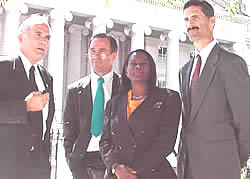
Robert Schulz, and former IRS agents John Turner, Sherry Jackson, and
Joseph Banister - work together to stop government corruption
and fraud.
Video:
Three
Former IRS agents - Turner, Jackson, and Banister - by Symonds
|
When its time to ask questions, the Congress, Treasury,
and IRS officials avoid these highly tax educated and
experienced professionals like the plague.
The same officials don't mind taking time to spy on them, arrest
them, raid their homes, harass them, investigate them, make it
difficult to get a job, and make attempts to shut them down -
or shut them up.
The major media also avoids IRS whistleblowers, and their stories,
until the whistleblowers are sued by the Government. Then, the
media will happily tell you about how bad these people are, often
failing to mention - these were former IRS agents with a great
deal of background in taxation. [Our next IRS Whistleblower,
Thomas Coleman Andrews, former IRS Commissioner, explains why
our Government and the major media are so treasonous.]
Robert 'Bob' Schulz is not a former IRS agent,
but a citizen who also fights government abuse...
|
| "People
are kidding themselves. They don't have the buying power they
used to have. A lot of the people living today don't know what
the buying power of success was before we decided to use excessive
income taxes to punish success and estate and gift taxes to force
every generation to start from scratch."
-- T. Coleman Andrews

T. Coleman Andrews
IRS Commissioner, 1953-1955
IRS then:
[Everyone in Congress and in Government, read this...]
"...there are a lot of people in public office... who haven't
got the guts to check unfairness because they're afraid somebody
will investigate them for doing whatever is right"
-- T. Coleman Andrews, Former Commissioner of Internal Revenue,
U.S. News & World Report, May 25, 1956
IRS now:
Investigating the whistleblower is
"a common tactic used against IRS employees who dare to speak
up."
-- Shelley Davis, Former IRS Historian, Statement to Senate Committee,
September 23, 1997
|
Thomas Coleman Andrews - IRS Commissioner, 1953-1955
Quoted from an interview in U.S. NEWS & WORLD REPORT, May
25, 1956, followed by the full interview.
"[The income tax...] is slowly but surely destroying
the middle class."
"Maybe we ought to see that every person who gets a tax
return receives a copy of the Communist
Manifesto with it so he can see what's happening to him."
"Don't forget that there are many parts of the law in which
Congress did not spell out its intention but instead empowered
the Secretary or his delegate to say what was meant." [Can
you believe this? One man, the Secretary (just some guy), or worse
a delegate (some other guy) has been telling us what to do.]
"I have had members of Congress tell me frankly that they
just don't have time to give thorough consideration to a good
deal of what comes before them for attention."
"I've had some of those men tell me they had to depend absolutely
upon the staffs of their committees for advice as to what to do."
[Can you believe this? Some of the elected in Congress don't
know what they are doing, or deciding, or they are lacking critical
thinking skills.]
"Our tax laws are not made by members of Congress... nor
by the committees of Congress... but by the staff members of the
tax committees. That's true of all legislation."
[Doesn't this invalidate laws passed by Congress, and make
many in Congress unqualified in the job they applied for?]
"...they began to discover [in the early days of income
tax] that while the law was simple it was unjust, and they
had to do something about it, they began to add on all kinds of
fancy gimmicks, gadgets and thou-shalt-nots, until it now adds
up to the point where it's so complicated that nobody can understand
it [even our clearest thinker, Einstein, said he couldn't
understand it]. I say to you that any law that isn't understood
even by the people who pass it, let alone by those subjected to
it, shouldn't be imposed..."
-- T. Coleman Andrews, 1956
[Socialism is the preparatory stage used to overthrow capitalism
and freedom, then private ownership is replaced by communism.
The individual is then told what to do, where to do it, how, and
when - http://en.wikipedia.org/wiki/Communism
* The US Constitution says, "The United States shall guarantee
to every State in this Union a Republican Form of Government"
- Art. IV, Sec. 4 ]
[How familiar - First, they came for the farmers, but I was not
a farmer, so I did not speak up... then they came for the manufacturers,
but I was not a manufacturer (and even cheered the cheap Chinese
goods)... then they came for the doctors, I did nothing ('healthcare,
shmealthcare, screw those rich people')... then they came for
the computer scientists and engineers... (the shape of an 'L'
clearly on my forehead)... and soon, my countrymen were replaced
with H1-B visa's. The cheap goods and cheap labor were
everywhere.]
|
Shelley L. Davis - The first, and last, official IRS Historian.
 Source: http://web.archive.org/web/20060129183705/http://www.senate.gov/~enzi/davis.htm Source: http://web.archive.org/web/20060129183705/http://www.senate.gov/~enzi/davis.htm
PREPARED STATEMENT OF
SHELLEY L. DAVIS
BEFORE THE SENATE FINANCE COMMITTEE
OVERSIGHT HEARING ON THE INTERNAL REVENUE SERVICE
TUESDAY, SEPTEMBER 23, 1997
Mr. Chairman and Members of the Senate Finance Committee, I am
pleased to be able to share a few of my thoughts and experiences
with you today as you explore specific issues of IRS abuse of
those the tax agency likes to call its "customers" --
American taxpayers.
For 16 years I worked as an historian for the federal government.
Nine of those years were with the Department of Defense and the
final seven were spent as the first and unfortunately, the last,
official historian for the Internal Revenue Service. At the end
of 1995, I resigned from my federal career in protest over the
unwillingness of the IRS, or the Treasury Department Inspector
General, to investigate my complaint of illegal document destruction
by the IRS. I learned that the same federal investigator to whom
I originally reported my concerns regarding this, had turned around
and opened an investigation of me on unfounded and false charges
of "wrongful release of confidential information." Later,
I learned that this is a common tactic used against IRS employees
who dare to speak up against management. I knew then that I had
no alternative but to resign and try to raise awareness of the
intransigence, arrogance, and abusive patterns of behavior that
I found all too common inside the headquarters of the IRS. I decided
to write a book which was published earlier this year entitled,
"Unbridled Power."
My testimony today will touch briefly on three areas:
1. ) The cultural climate of the IRS;
2. ) List keeping at the IRS;
3. ) The IRS definition of "tax protester."
My introduction to the culture of the IRS came during my earliest
days with the tax agency, in the fall of 1988. Although I had
been hired as the first historian for the IRS, I found little
interest or support for my efforts. I found even less history.
By history I mean both an awareness of the heritage of the IRS
as well as the raw material (the documentation) from which narrative
history is distilled. Neither the documents nor the heritage were
to be found. Initially, I found this curious. Later, I found it
alarming. At the IRS National Headquarters, there seemed little
connection between the work of employees and actual tax collection--what
I presumed to be the mission of the IRS. Rather than possessing
any basic curiosity about the past, the IRS employees I encountered
exhibited a wariness, a suspicion--assuming that anyone looking
for records must have some definite agenda. An agenda presumed
to be negative.
This reluctance to think about the past translated into routine
day-to-day operations, meaning that all documents were tossed,
shredded, whatever, when a program was completed--or shut down
as in the case of many IRS computer projects. No records. No paper
trail. No history.
As time went on, I realized that this not only made my job as
historian virtually impossible, but that it guaranteed that the
IRS could never be held accountable for its actions. With a sense
of historical development, I came up with my own interpretation
of this phenomenon. One could easily pass off the reluctance of
the IRS to acknowledge its past as a reaction to a constant barrage
of criticism. But the IRS is certainly not the only federal agency
subjected to criticism from the press, Congress, or the public.
Instead of reflecting on positive actions in response to criticism,
the IRS proclaims that any criticism of the agency is "IRS
bashing" and "will only lead to more tax protesters."
Rather than respond with solid information, historical examples,
and analysis, the IRS jumps around skittishly, telling Congress
that this reorganization, or that new position, or another new
task force will remedy the current problem. The IRS has learned
that its most effective response to inquiring questions from Congress,
from the press, or from the American people is to hide behind
the privacy laws. These are the laws meant to protect taxpayers.
But by endlessly citing restrictions on its authority to comment
on taxpayer cases, the IRS deflects criticism for any and all
actions. In essence, the response of the IRS to question about
anything and everything is, "Trust us. We're doing the right
thing. We just can't tell you what that is because we're protecting
American taxpayers."
A corollary to this defensive shield is the penchant of the IRS
to destroy its paper trail. There were virtually no records of
IRS actions throughout the twentieth century in any of the repositories
where one would normally find federal records: the IRS itself,
the National Archives (including the permanent archives in Washington,
D.C., the 10 records centers around the country, or the Presidential
libraries.)
In my early years with the IRS, a good question to ask
was, "Where are the records?" What I learned was shocking.
The records had been destroyed. Gone. Shredded. Tossed. They no
longer exist due to a lack of attention to, or concern for, the
law which requires all federal agencies to preserve records of
what they do. It is as though the IRS assumed that laws which
apply to the FBI, to the CIA, to every other part of the federal
establishment can be ignored.
No other agency of our government could get away with
this. I questioned the reason why it had taken so long
for anyone to realize that the records were not just missing,
but destroyed. I believe the answer is based on fear. As taxpayers,
why would we ever question the one agency that can truly bite
back? Our fear of suffering a personal attack from the IRS generally
keeps most of us in check. Our fear of being audited has allowed
the IRS to theoretically eliminate any potential smoking guns
by trashing its own records. This ensures that it can never be
held accountable for its actions. How can you prove any wrongdoing
when the evidence is already destroyed?
The IRS has learned that the privacy protections are its best
weapon in its war against its "customers." There is
an "us against them" mentality which is far too common
among IRS employees. I witnessed and experienced this attitude
firsthand for over seven years working at the IRS headquarters.
When I questioned the lack of record keeping by the IRS, it was
made clear to me that I was a "lone ranger," a "loose
cannon," and "not a team player." Is it any wonder
they investigated me?
I'll conclude this section with a stark example from my personal
experience. After my protest resignation at the end of 1995, admittedly
I was not on the "most favored" list of IRS. But when
I went to the IRS National Office on Monday, April 15, 1996, to
meet a friend who had invited me for lunch to celebrate my birthday,
I did not expect to be threatened with arrest. But that is what
happened.
While waiting for my friend to meet me at the entrance of the
building, I was pulled aside by an IRS internal security agent
who told me to leave immediately because I was officially "banned"
from the building.
I thought this was odd as I was standing in the front entrance,
a public space. When I asked for an explanation, I was told that
I was "banned" because I "did not turn in my official
identification badge when I resigned four months earlier."
This was untrue.
When the agent detaining me prepared to call for Federal Protective
Service agents to carry out her threat to arrest me, I knew I
had to make a quick decision: let them carry through with this
absurd threat, or turn and leave. I left. To this day, I wish
I had stayed and made them carry through with their threat. The
IRS brought false charges against me, used government resources
to pursue a false investigation of me, and continued to harass
me even after I had resigned. With the IRS, as I am sure you will
hear from others today, retaliation is prompt, swift and catastrophic.
My years with the IRS were spent exclusively in the National
Office, the headquarters of the tax agency. Throughout my tenure
at the IRS, I often heard stories that different types of codes
were used to identify taxpayers and returns.
I have specific knowledge of one type of list maintained inside
the IRS. It is a product of a secretive, cloistered unit of the
IRS which existed from 1969 through 1973, known by the name "Special
Services Staff," or SSS.
The SSS list had approximately 11,000 individuals and organizations
designated as possible audit targets by the IRS. Who were these
people and organizations? Some were names you will recognize:
Shirley MacLaine, Joan Baez, John Lindsay, the Black Panthers,
and the Student Nonviolent Coordinating Committee(SNCC).
But most of those who made it onto the list were not household
names but were individuals the SSS determined were of questionable
character as determined by the SSS.
Ten employees of the SSS dutifully clipped newspaper articles
each day. The FBI willingly sent over its own files on political
dissidents and protesters, and subscriptions were taken to radical
publications which were perused for names and other leads. All
in all, the SSS targeted individuals with no known tax problems
for audit simply because of their political activities.
The commissioner who abolished the SSS, Donald Alexander, actually
testified before Congress in 1975 that he believed the SSS records
should be taken "out on the mall and burned."
Yet, despite the fact that the SSS files remain intact at the
IRS (at least through my resignation at the end of 1995), the
IRS steadfastly refuses to release the files to researchers or
even to the National Archives for safekeeping. Why? Because they
contain "taxpayer information." Who is protecting whom,
one has to wonder? What has all this got to do with the present?
Today I believe there exist thousands of names of American taxpayers
whose Master Files are coded as TC-148, which brands them as "Illegal
Tax Protesters." Whether this is a list, or compilation of
files which bear that designation, is semantics. Just how many
Americans bear this designation?
At the very least, we need to know if we are on that list, We
reserve that right. The IRS says we can't know and don't have
a right to know while simultaneously claiming Congress wants it
this way.
The only thing being protected in this scenario is the IRS. Just
what is a tax protester? Your definition, like mine, is probably
different from the IRS definition. I learned that while inside
the IRS.
A tax protester, in my definition, is not someone who may oppose
our system of taxation, but pays his taxes nonetheless. A tax
protester is not someone who says that our tax system is broken
and must be dismantled, but still files a Form 1040. A tax protester
is not someone who merely criticizes the IRS. A tax protester
is not someone who challenges an IRS assessment. But in the mind
of the IRS, all of the above ideas fit the unofficial IRS profile
of a tax protester. In the cloistered environment of the IRS,
criticism of the IRS, or the income tax, equals tax protester.
Anyone who has the misfortune of bearing that title is most likely
going to witness first hand just what "taxpayer abuse"
really means.
Don't get me wrong. I am not in any way condoning the actions
of those who, by one manner or another, attempt to cheat or not
live up to their financial responsibilities as a U.S. citizen.
But I do recognize the use of the label of "Illegal Tax Protestor"
as another powerful weapon of the most powerful agency in America.
It is time for Congress to compel the IRS to be more forthcoming
about its audit procedures, even though the IRS would like us
to believe that our system of taxation will collapse if the American
people know how their tax collector goes about his or her business.
The IRS gains too much benefit from the privacy laws to come
clean on its own. The culture of the IRS, built over decades of
learning to hide behind the privacy laws, will not change on its
own. Without intervention from Congress, it will not happen. Last
year, a top career IRS executive testified before Congress that,
"There is the general view that the more mysterious tax enforcement
is, the more likely taxpayers will voluntarily comply." Mystery
breeds distrust and contempt. It also breeds fear, which compels
many taxpayers to comply with the tax laws because they are afraid
of the consequences, but it does not breed voluntary compliance
or trust.
The arrogance of the IRS is outrageous and harmful. We lose more
than we gain by allowing the IRS to operate in this manner. Congress
must demand accountability from the IRS. Congress must shine the
spotlight on the IRS and never switch the power off.
Thank you.
-- End of Shelley Davis' statement.
|
|



